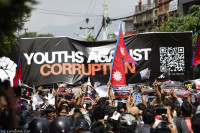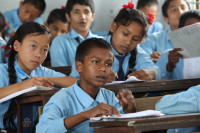Opinion
Beyond borders
The current blockade poses an acute threat to the public health gains made by Nepal
Jaya Lamichhane
If the ongoing blockade by India persists any longer, Nepal could face yet another humanitarian crisis barely seven months after the massive earthquake hit the country in April. This blockade has multiple dimensions: regional fight for resources, some valid demands of the protesting groups for rights, international geopolitics and failed diplomacy. Yet, all of these have not only adversely affected the daily lives of the people, but also had a negative impact on the economy, development, social harmony, education and health.
Deadly risk
In particular, the blockade has brought transportation services to a near halt and as a result, the production and distribution of essential medicines, fluids, oxygen and other essentials for basic health and emergency services has been severely hampered. This could soon lead to decreased quality of care and quantity of health services and increase of the risk of morbidity and
mortality. Limited supply of fuel directly impacts transportation of essential vaccines and mass drug administration across the country putting disease control, elimination and eradication efforts at sheer risk. Not to forget, most of the cold chain freezers in rural Nepal run on liquid fuel, and restriction on fuel supplies will impact vaccines and its effectiveness and efficacy. This could ultimately lead to increased health vulnerability and even put the eradication of diseases like polio at stake.
Of late, Nepal has made significant progress towards achieving health goals like reducing maternal and child mortality rates. But this blockade poses a threat to those gains by limiting ante- and post-natal care, and basic and essential emergency obstetrics care. These heighten the vulnerability of maternal and child health leading to a risk of increase in maternal and child mortality, more low birth weight babies and in the long run, it could decrease the life expectancy of Nepali people, even though life expectancy is increasing worldwide.
Regional risk
First, the earthquake damaged heath infrastructures in hilly districts and just when the discourse on reconstruction had gained momentum, another crisis has begun to take a toll on existing health facilities. According to the deputy prime minister, the country suffered damages worth around $7 billion due to the quake. The impact of this almost two-month blockade, however, is estimated at more than $5 billion. Already, the impacts of the blockade are visible in the health sector in the form of scarcity of life-saving medicines and limited availability of emergency care. However, the long-term impact of the blockade could be far scarier than what has been observed till date. Furthermore, it could not also impact the global community.
First, this blockade has already had a catastrophic effect on the country’s economy. This could put the initiatives to ensure universal health coverage and strengthen the health system at stake. The health budget is more likely to be reduced when the national budget is cut down. This will limit the provision of essential services and its coverage leading to increased health vulnerability. As a result, it could increase morbidity and mortality; decrease life expectancy; increase the risk of emerging diseases and health security; and child development.
Second, the adverse impact on health services in Nepal could put the health of the entire region at risk. Nepal is doing well in controlling vaccine preventable diseases due to its immunisation coverage and any challenges on coverage and compromise on quality of vaccination are a threat to disease elimination and eradication efforts like that of polio and measles. In case of resurgence of polio in Nepal, it could risk the polio eradication endgame strategy at the global level. India, as the next-door neighbour could face a risk as it was declared polio-free just last year along with Nepal. Likewise, increased vulnerability can heighten the global health security risk at a time when emerging and re-emerging diseases are looking for opportunities to spread rapidly. So, any haemorrhagic fevers, cholera or other disease outbreaks, would have a catastrophic impact not only on Nepal but also at a global level. Nepal has faced a number of avian influenza outbreaks in poultries and so far, they have not affected humans. The current situation, which has decreased the resiliency of the government to respond and increased the vulnerability of the people, could provide fertile grounds for the possible outbreak of avian influenza in humans. Any blockade in this globalised world, therefore, can not only create problems for the nation facing the embargo but also other countries. And inevitably, the first ones to be affected would be neighbouring countries.
Lamichhane is a public health specialist




 8.12°C Kathmandu
8.12°C Kathmandu










